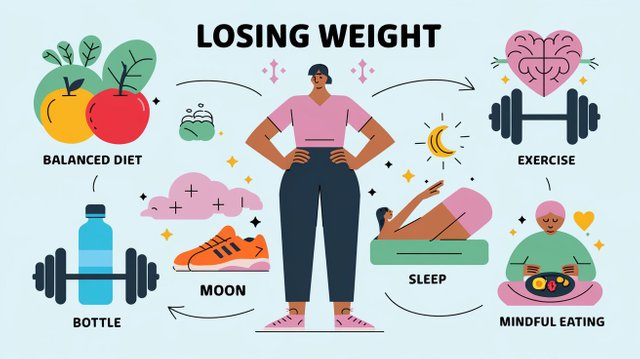The Best Ways to Lose Weight: Effective Strategies and Benefits

Losing weight is a journey that many embark on for various reasons, from improving health to boosting self-confidence. With the plethora of advice available, it can be overwhelming to determine the most effective and sustainable methods. In this comprehensive guide, we'll explore the best ways to lose weight, focusing on practical strategies and the numerous benefits that come with achieving and maintaining a healthy weight.
1. Understanding the Basics of Weight Loss
Before diving into specific methods, it's crucial to understand the basic principle of weight loss: creating a calorie deficit. This means consuming fewer calories than your body expends. However, not all calories are created equal, and the quality of your diet plays a significant role in your success.
2. Balanced Diet: The Foundation of Weight Loss
a. Prioritize Nutrient-Dense Foods
Nutrient-dense foods, such as fruits, vegetables, lean proteins, whole grains, and healthy fats, provide essential vitamins, minerals, and antioxidants. They are also typically lower in calories and higher in fiber, which helps you feel full and satisfied. Incorporating these foods into your diet can reduce cravings for unhealthy snacks and support overall well-being.
b. Monitor Portion Sizes
Overeating, even healthy foods, can hinder weight loss progress. Paying attention to portion sizes is crucial. Consider using smaller plates, measuring portions, and being mindful of serving sizes to avoid consuming excess calories.
c. Reduce Added Sugars and Processed Foods
Processed foods often contain added sugars, unhealthy fats, and empty calories. Reducing consumption of sugary drinks, snacks, and fast food can significantly cut down on calorie intake and improve overall health.
3. Regular Exercise: Boosting Metabolism and Building Muscle
a. Cardiovascular Exercise
Cardio exercises, such as running, cycling, and swimming, are excellent for burning calories and improving cardiovascular health. Aim for at least 150 minutes of moderate-intensity or 75 minutes of high-intensity cardio per week to enhance fat loss.
b. Strength Training
Building muscle through strength training not only sculpts your body but also boosts your metabolism. Muscle tissue burns more calories at rest compared to fat tissue. Incorporate weight lifting, resistance bands, or body-weight exercises into your routine at least two to three times a week.
c. High-Intensity Interval Training (HIIT)
HIIT involves short bursts of intense exercise followed by brief periods of rest. This workout method can be highly effective for burning calories and improving endurance. It's time-efficient and can be adapted to various fitness levels.
4. Mindful Eating: Cultivating a Healthy Relationship with Food
a. Listen to Your Body
Mindful eating involves paying attention to hunger and fullness cues. Eat when you're hungry and stop when you're satisfied, rather than eating out of boredom or emotional distress. This practice helps prevent overeating and encourages a healthier relationship with food.
b. Slow Down and Savor
Eating slowly allows your brain to register fullness, reducing the likelihood of overeating. Savor each bite, enjoy the flavors, and take your time during meals. This simple habit can make a significant difference in your weight loss journey.
5. Stay Hydrated: The Often Overlooked Key to Weight Loss
Drinking enough water is essential for overall health and can aid in weight loss. Sometimes, our bodies mistake thirst for hunger, leading to unnecessary snacking. Staying hydrated helps regulate appetite, supports metabolism, and promotes optimal physical performance.
6. Adequate Sleep: The Unsung Hero of Weight Management
Sleep is a critical yet often overlooked component of weight loss. Lack of sleep can disrupt hormones that regulate hunger and appetite, leading to increased cravings and overeating. Aim for 7-9 hours of quality sleep per night to support your weight loss goals and overall well-being.
7. Benefits of Losing Weight: Beyond the Scale
The benefits of losing weight extend far beyond the numbers on the scale. Here are some significant advantages:
a. Improved Physical Health
Losing weight can reduce the risk of chronic diseases such as type 2 diabetes, heart disease, and hypertension. It can also alleviate joint pain, improve mobility, and boost energy levels.
b. Enhanced Mental Well-being
Weight loss can lead to increased self-esteem and confidence. Achieving your weight loss goals can also reduce symptoms of anxiety and depression, as regular exercise and a balanced diet have mood-boosting effects.
c. Better Sleep Quality
As mentioned earlier, weight loss and sleep quality are interconnected. Achieving a healthy weight can lead to better sleep, which in turn supports further weight loss and overall health.
d. Increased Longevity
Maintaining a healthy weight is associated with a longer life expectancy. By reducing the risk of chronic illnesses and improving overall health, you increase your chances of living a longer, healthier life.
8. Setting Realistic Goals and Staying Consistent
Weight loss is not a quick fix but a gradual process. Setting realistic goals and celebrating small victories along the way is crucial. Consistency is key; it's better to make sustainable changes you can maintain long-term rather than resorting to extreme diets or exercise regimens.
9. Seek Professional Guidance
If you're struggling to lose weight or have specific health concerns, consider consulting a healthcare professional, such as a registered dietitian or a personal trainer. They can provide personalized advice and support to help you achieve your weight loss goals safely and effectively.
Conclusion
Losing weight is a transformative journey that offers numerous physical and mental health benefits. By focusing on a balanced diet, regular exercise, mindful eating, hydration, and adequate sleep, you can achieve sustainable weight loss and improve your overall quality of life. Remember, the best way to lose weight is the one that fits your lifestyle and is sustainable for the long term. Start your journey today, and embrace the positive changes that come with a healthier, happier you.